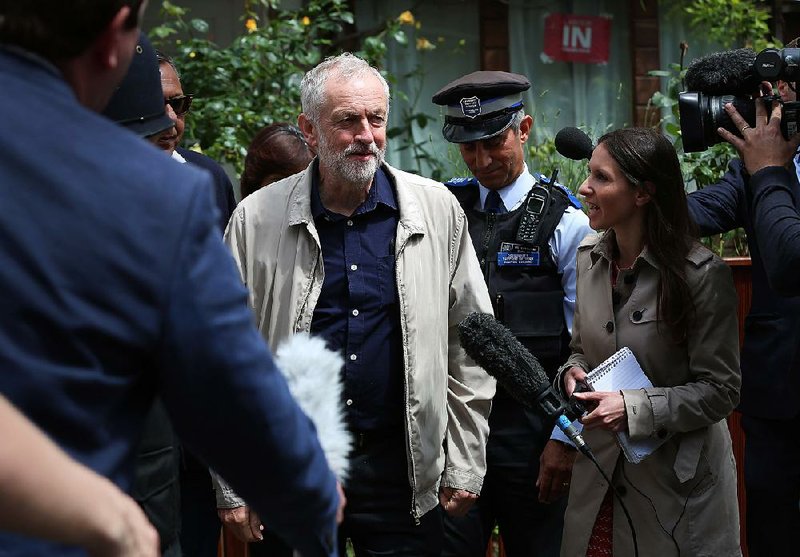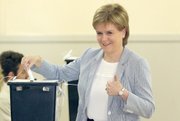LONDON -- Britain's decision to remove itself from the European Union produced more political turmoil Sunday as Scotland's leader threatened to block the move and the head of the opposition Labor Party faced opposition from his own legislators.
The vote to leave sent the pound and global stock markets plunging. Britain's Treasury said Finance Minister George Osborne would make a statement early this morning "to provide reassurance about financial and economic stability" before the London Stock Exchange reopens.
The leaders of the successful campaign to leave the EU stayed largely out of the public eye, as opponents accused them of lacking a plan to calm the crisis the result has triggered. In his first statement since Friday morning, "Leave" leader and former London Mayor Boris Johnson used his column in the Daily Telegraph newspaper to urge unity and say "the negative consequences [of the vote] are being wildly overdone."
"This climate of apprehension is understandable, given what people were told during the campaign, but based on a profound misunderstanding about what has really taken place," Johnson wrote. "At home and abroad, the negative consequences are being wildly overdone, and the upside is being ignored."
He said Britain would forge "a new and better relationship with the EU -- based on free trade and partnership, rather than a federal system."
The vote, however, risks causing a political schism in the United Kingdom. Scottish First Minister Nicola Sturgeon said she would "consider" advising the Scottish Parliament to try to use its power to prevent Britain from leaving the EU. She said Scottish lawmakers might be able to derail the move by withholding "legislative consent" for a British exit.
"If the Scottish Parliament was judging this on the basis of what's right for Scotland, then the option of saying 'We're not going to vote for something that is against Scotland's interests,' of course, that is on the table," she said of the possibility of withholding consent.
Sturgeon said she believes Scotland's approval is required for the move but conceded that the British government would likely take "a very different view."
Thursday's U.K.-wide vote to leave the EU was very unpopular in Scotland, where 62 percent cast ballots to stay, and Sturgeon said she is studying ways to keep Scotland part of the EU.
The Scottish question looms large because Sturgeon also has said another referendum on Scottish independence from Britain is "highly likely" as a result of Britain's EU vote. A Scottish referendum in 2014 ended with voters deciding to remain in Britain, but analysts believe Britain's withdrawal from the EU may strengthen the independence movement.
In Northern Ireland, which also is part of the U.K., Deputy First Minister Martin McGuinness said his priority is forging "special arrangements" to enable Northern Ireland to maintain its EU ties. Some opponents of leaving have also talked of trying to use Northern Ireland's Assembly to try to block Britain's departure.
Northern Ireland voters also expressed a preference for keeping Britain in the EU.
Northern Ireland Secretary Theresa Villiers, Prime Minister David Cameron's lead official in Belfast, played down the suggestion that the Scottish Parliament or the Northern Ireland Assembly had the standing to prevent a British departure from the EU.
She said decision-making power resides solely in the British Parliament, which is expected to abide by the results of the referendum, which showed 52 percent of British voters wanted out.
That no British political leaders have stepped forward to reassure Britons has been a concern for many.
"The total lack of leadership in the wake of the referendum is probably even more worrying than the vote's unexpected outcome," wrote Carsten Nickel, deputy director of research at Teneo Intelligence, in a research note. "U.K. domestic politics should be considered as a source of political risk for the foreseeable future."
"I've never known a weekend like it," said Tim Bale, professor of politics at Queen Mary University of London. "[It's] a time when the stakes are incredibly high and those people charged with handling them are either absent without leave or tearing lumps out of each other."
The vote is already cutting short Cameron's career. He said after the results that he will resign as prime minister when the Conservative Party chooses a new leader, who will be responsible for implementing the separation from the EU.
The new Conservative leader, who will become prime minister, is expected to be in place by October.
Top opposition lawmakers were pushing for new leadership, as well.
Labor Party leader Jeremy Corbyn, a longtime critic of the EU who was criticized by many for doing a weak job presenting the party's position favoring membership in the bloc, now faces opposition from senior members of his "shadow cabinet" -- the opposition party's mirror government of senior lawmakers.
Eleven "shadow cabinet" members resigned Sunday after Corbyn fired shadow Foreign Secretary Hilary Benn overnight for reportedly plotting against him. The dissidents want Corbyn, who represents the far-left wing of the party, ousted before the next general election because many believe he cannot win.
"At this absolutely critical time for the country, the Labor Party needs strong and effective leadership," Benn told the BBC's Andrew Marr Show. "Jeremy is a good and decent man but he's not a leader. And that's a problem."
In her resignation letter, shadow Health Secretary Heidi Alexander told Corbyn he had to go.
"I do not believe you have the capacity to shape the answers our country is demanding and I believe that if we are to form the next government, a change of leadership is essential," she wrote.
In a statement released late Sunday, Corbyn said he would not resign and would run in any new leadership contest. Senior allies said he still has strong support among the party's rank-and-file members, who chose him as leader last year.
"I regret there have been resignations today from my shadow cabinet," Corbyn said. "But I am not going to betray the trust of those who voted for me -- or the millions of supporters across the country who need Labor to represent them."
Concerns about last week's EU referendum ranged far beyond U.K. politics.
International leaders spent the weekend preparing to respond. After initially furious reactions to the vote from European capitals, there were gentler words Sunday. German Chancellor Angela Merkel's chief of staff urged a timeout in Britain's exit from the European Union, saying in a newspaper interview that U.K. leaders should pause to consider the implications.
In Rome, U.S. Secretary of State John Kerry urged Britain and the EU to manage their divorce responsibly for the sake of global markets and citizens. Today, he will be the first senior U.S. official to visit London and Brussels since the referendum, and he said he would bring a message of U.S. support to both capitals.
He offered no concrete suggestions for how the two sides should make good on the decision by British voters to leave the 28-nation bloc.
Responsible handling of the situation, Kerry said, will help "the marketplace understand there are ways to minimize disruption, there are ways to smartly move ahead in order to protect the values and interests that we share."
Merkel will host French President Francois Hollande and Italian Prime Minister Matteo Renzi in Berlin today. The heads of what will be the EU's three biggest economies once the U.K. is excluded are expected to discuss their response ahead of a meeting of the bloc's 28 leaders in Brussels on Tuesday.
Pope Francis urged the EU to come up with creative ways to stay together, saying it's clear "something isn't working in this unwieldy union."
"The European Union must rediscover the strength at its roots, a creativity and a healthy disunity, of giving more independence and more freedom to the countries of the union," the pontiff told reporters as he flew home from Armenia.
The key, he said, is to rekindle the will to stay together with "creativity and new life."
A spate of incidents in the U.K. since the vote also have Britons concerned the result is emboldening extremist elements in society.
Police are investigating a report of "racially motivated" damage at the Polish Social and Cultural Association, a community center in West London, a spokesman for the Metropolitan Police said on Sunday. Twitter users described graffiti that read "Go Home" daubed on walls and windows. In Cambridgeshire, police are investigating flyers left outside a primary school that said, "Leave the EU, no more Polish vermin," the Evening Standard reported.
"There is no question the U.K. is shifting to a more racist atmosphere and policies. This is a rhetoric that's showing up in the lives of schoolchildren," said Adam Posen, a former member of the Bank of England's Monetary Policy Committee who now leads the Peterson Institute for International Economics. "We're legitimizing politics and politicians that play with racism in a much more dangerous way than Richard Nixon ever did."
The "Leave" campaign's message was centered on reducing immigration, including by raising the specter of Turkish membership in the EU -- a prospect European diplomats say is remote at best. A week before the referendum, U.K. Independence Party leader Nigel Farage unveiled a billboard showing a column of hundreds of refugees walking on a road, under the heading "Breaking Point."
Speaking to the BBC on Sunday, former Prime Minister Tony Blair said political leaders "have a big responsibility to help our country get through what's going to be an agonizing process." After a vote that largely pitted London, Scotland and a few other enclaves in favor of staying in the EU against the bulk of England and Wales, "we have a divided country but there is the possibility of bringing people back together if we are sensible about it."
Information for this article was contributed by Gregory Katz, Bradley Klapper, Jill Lawless, Nicole Winfield of The Associated Press and by Robert Hutton, Svenja O'Donnell and Matthew Campbell of Bloomberg News.
A Section on 06/27/2016


